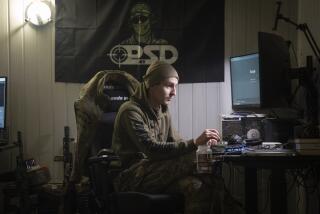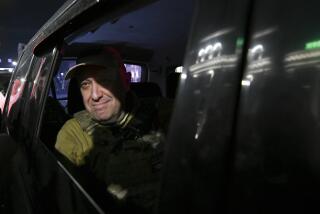Chechen Leader-in-Hiding Won’t Give Up the Fight
- Share via
GROZNY, Russia — Since he was chased out of this capital by Russian artillery a year ago, Chechen President Aslan Maskhadov has been a hunted man, hiding out in the southern mountains of his rebellious republic.
To Moscow, which deposed his government and imposed federal control over most of Chechnya, he is a bandit and a terrorist. But tens of thousands of Russian troops in the republic have been unable to extinguish his much smaller band of determined fighters. And Maskhadov, a former Soviet military officer who was elected president in 1997, remains defiant.
In a rare communication to a Western newspaper from his mountain hide-out, Maskhadov--responding on audiotape to written questions from The Times--predicted this month that his forces will deal Moscow a humiliating defeat in Chechnya.
Saying his loyalists were fighting with “extreme hatred” against “barbarism,” Maskhadov asserted that Russian forces will suffer the same fate in Chechnya as the Soviet Red Army did in Afghanistan more than a decade ago. “Their army will leave this place in shame,” he said.
But Maskhadov said he was also interested in negotiating with Russia for the sake of the Chechen people.
Referring to a resolution by the Council of Europe parliamentary assembly for an immediate cessation of combat and talks without conditions, Maskhadov said: “We are ready. . . . We are not rejecting contacts. The ball is in the Russian court.”
By the last official figures, about 2,500 Russian troops had been killed in Chechnya as of October, and the government has acknowledged that on average 20 soldiers die each week in hit-and-run attacks, shelling and mine explosions.
In Grozny, Russian checkpoints are shot at nightly and gun battles between the rebels and army and Interior Ministry troops are commonplace. In a daytime incident earlier this month, Russian soldiers fired on a Chechen car whose occupants had shot at a checkpoint. All four men inside the vehicle were killed and a bystander was injured. Yet rebel fighters were seen brazenly driving near the same spot in suburban Staraya Sunzha three days later.
Despite such occurrences, the official Russian position is that the war is over, the rebels are desperate and all that is needed now is to mop up the last “ringleaders”--specifically Maskhadov, Chechen rebel leader Shamil Basayev and the Arab warlord who goes by the name Khattab.
On Monday, Russian President Vladimir V. Putin went further, announcing that Russian troop levels will be reduced in Chechnya and that the Federal Security Service, or FSB, the main successor to the KGB, will take over command of the “anti-terrorist” operations.
In a televised appearance on the NTV network, Putin spokesman Sergei V. Yastrzhembsky said a new phase in the conflict is beginning, with the stress now being put on the “neutralization--or if you choose, the elimination” of rebel leaders.
In the spirit of regarding the war as winding down, Yastrzhembsky earlier said Russia had ceased issuing regular reports on military casualties.
Beslan Gantemirov, the Russian-installed mayor working behind heavy security barricades in Grozny, said the military campaign has been so successful that there is absolutely no reason to talk to Maskhadov or his representatives.
“Why hold talks with a man who has lost all influence and power?” he said, according to a report Friday in the newspaper Izvestia.
Maskhadov, 49, was a Soviet colonel who returned to his native republic in 1991 to fight for independence under Chechen leader Dzhokar M. Dudayev. After Dudayev’s death in a 1996 missile attack, Maskhadov--then considered the most moderate candidate--was elected to a four-year term as president in January 1997 with 59% of the vote. He is expected to drop the title after this month but continue to call himself commander in chief of the rebel forces.
According to a Times representative who met with Maskhadov this month, the Chechen president appears haggard and weary after his year in hiding. The meeting was abruptly canceled just after it began because aides believed that Russian forces were closing in. Maskhadov taped his replies, which were passed to The Times through the intermediary.
On his audiotape, Maskhadov spoke calmly and quietly, saying he was certain that the Russians will be forced to the negotiating table by an ongoing campaign of small guerrilla attacks designed to wear down and eventually drive their troops out of Chechnya.
He charged that Russian forces have committed summary executions of civilians and that they routinely steal from Chechens: “They have stripped three skins from these emaciated people.” The very harshness of the occupation is influencing more people to take up arms on the separatists’ side, he said.
As an example, he claimed that two women who recently lost their husbands asked to be trained as suicide bombers. Maskhadov said he answered them: “Go home. Raise your children. Chechnya will find men to avenge their deaths. . . . But I had a very hard time talking them out of it.”
Chechens won a degree of independence from Moscow as a result of a bloody 1994-96 war. But Russia invaded Chechnya again in September 1999, citing both a series of apartment building blasts in Russia that were blamed on Islamic extremists from Chechnya and an Islamic guerrilla incursion into the neighboring Russian republic of Dagestan.
Russian troops, battering their way in with heavy bombing and artillery attacks, advanced methodically into Chechnya. By last January, Maskhadov was forced to abandon his capital, which had been bombed and shelled to ruins. On Feb. 6, the Russian flag was raised over the city center after the rebels had fled into the mountains.
Maskhadov defended the performance of his troops in slowing the Russian advance and said he and his fighters remain unified in what he called the war’s new phase.
“Today we are engaged in a full-scale guerrilla war. And what does it mean?” Maskhadov said. “It means that [by] breaking into small, flexible groups [of] from 10 to 15 men, or even smaller groups, we are rendering crushing blows on checkpoints, on commandants’ offices, on military units. That is the tactic.”
For now, he said, “the most efficient warfare is operations of small, flexible groups designed to morally and physically wear out the enemy.”
Maskhadov warned that the guerrillas would be in a favorable position to step up their attacks if Russian forces follow through on announced plans to put garrisons in every Chechen town.
“We have about 300 villages and towns, and--if there will be a garrison in every settlement--these are good targets for us,” he said.
His moujahedeen already have plans to retake Grozny one day, as they did successfully during the previous war, Maskhadov said. It will happen, he said, “if not in a month, then in a year. If not in a year, then in 10 years.”
“A regular army cannot and is not capable of winning a guerrilla war. It has never happened in history,” he said. “They cannot catch a handful of rebels, even if they deploy 2,000 pieces of hardware in one spot.
“When a huge army starts to react and turn around, [the guerrillas] are already 10 miles away, into the army’s flanks or the rear, ready to strike again,” he said.
In their attempts to evade capture, the guerrillas have been aided by the mountainous terrain in southern Chechnya.
“We are at home and much better prepared for a winter campaign,” he said. But the Russians, he asserted, are having a hard time operating and moving about with their heavy equipment. “In this fog, in this dirt and in this rain, they will kill more of their own troops than our fighters will.”
Nevertheless, Maskhadov seemed pessimistic that the conflict will end soon.
“They have staked everything on force, and they cannot bring themselves to admit that they have achieved nothing and should stop. . . . The young leader of Russia does not know what to do.”
More to Read
Sign up for Essential California
The most important California stories and recommendations in your inbox every morning.
You may occasionally receive promotional content from the Los Angeles Times.










